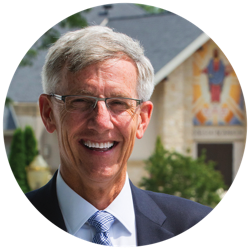You have made a big decision at attend college. This particular experience is not for everyone…for a variety of reasons. Why are you going to college? I’m sure you have reflected on this question but foundational to this choice must be your desire to continue learning. Academically, certainly. But also to prepare yourself for your unique life’s purpose.
So that is about you. But have you thought about the purpose of the school? This is not a simple, or unimportant, question. Every college or university approaches their mission differently and they all have a vision of what they want to be into the future. You should ask about this and see how it aligns with your preparation for the future.
Teaching needs to be a core mission…teaching you! A student-centered experience is what you will most often discover on a Catholic college campus so I won’t dwell on that aspect of college life…other than to suggest that the emphasis the school places on students should “fit” you. Some of this is reflected in conversation you will have with others as you consider big school vs. small school, urban school or rural school, or large class size vs. small class size.
But what of this desire institutionally to conduct research? Have you heard the phrase, “publish or perish?” In other words, the suggestion is that to be relevant as a faculty member one must constantly publish the results of new individual research efforts. I will offer that if the research is returned to the classroom (not just to the specialized field or discipline) then it has benefit for all.
How important is it that the faculty conducts research?
One starting point for understanding the proper role of research and teaching is to consider the distinctiveness of Catholic higher education. This experience…very different from what you will find at a public school…stems from a foundational belief that there is a unity to all knowledge. The ancient understanding had always been that all truth ultimately is one. All branches of knowledge can be integrated…they exist in harmony…the human experience is one of determining what is already present in our surroundings, in nature. There is a natural order to creation and we have been given the intellect to explore and discover the workings of the universe unlike any other creatures in this world. Since God has created everything, the Catholic perspective is that as we learn more we draw closer to understanding Him. Think about that…what other animal has the capacity to do what the human can do? We must be mindful that we can’t create the truth of how the world works, but we can discover this truth.
Funny thing about all of this…it is not new. It was commonly understood in the Medieval Ages that “research” ultimately led to one Truth…that our capacity to reason combined with our faith contributed to a single understanding of knowledge. In fact, the three great monotheistic religions of the world (Judaism, Christianity, and Islam) have long recognized an understanding of knowledge that is very different from what we are experiencing in modern times. At many institutions of higher education today, knowledge is very fragmented and specialized…rarely integrated. It stands alone. As such, these “multi-versities” have “walked away” from the very ideals upon which they were established. But a Catholic university is different: there is a unity of all knowledge that is enhanced at a Catholic “uni-versity” and you will see this in the liberal arts experience defined by the general education requirements (or core curriculum). As you look at the activities of the scholarly institutes on campus, you will see a focus on interdisciplinary efforts. You will see this reflected in the school’s mission statement. You will see this ideal—a blending of practical and particular knowledge—applied in the professional studies many Catholic colleges and universities offer. You will often “hear” this in the question that frames a publicly offered scholarly presentation.
Yes…conducting research is very normal at a Catholic college and has been since the Catholic Church established those first universities in the 11th century. Protecting, generating, and disseminating knowledge are core to Catholic higher education. The generation of new knowledge serves to make a contribution to a greater understanding of that unity of knowledge. Teachers who are researchers bring into the classroom a deeper understanding of the natural order. Researchers who are teachers conduct a richer and deeper engagement with students. On a Catholic campus, reason and faith combine in the research efforts to make meaningful contributions to the explanations and understandings in an environment that thrives on authentic academic freedom. Thus, research supports and enhances the teaching experience equally as teaching contributes to testing new ideas and defining future research needs.
Teachers are researchers…researchers are teachers.
Though not the sole focus, it is also fair to suggest that research is not treated as an add-on to the Catholic collegiate experience. Research makes possible the advancement of higher education supporting your preparation for tomorrow in three dimensions.
Will the college experience you are seeking help to develop your mind, to gain a vocation, and enrich your soul all in the service to others?
That’s an ideal outcome that is worthy of your consideration.

